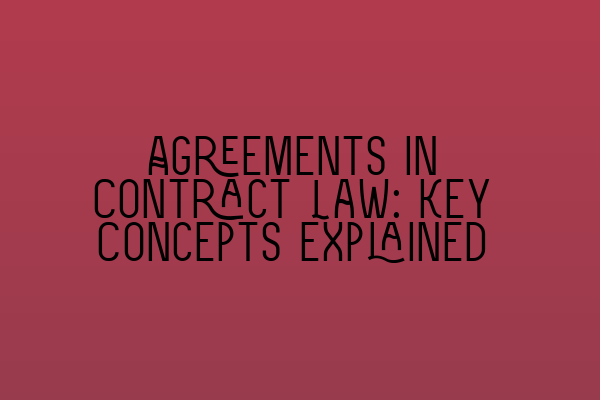Agreements in Contract Law: Key Concepts Explained
Contracts are the foundation of countless transactions and relationships in the business world. Understanding the key concepts surrounding agreements in contract law is essential for any solicitor practicing in this area. In this article, we will explore the fundamental aspects of agreements in contract law and provide a comprehensive explanation of the key concepts involved.
What is an Agreement?
At its core, an agreement is a mutual understanding between two or more parties that creates legally binding obligations. For a contract to form, there must be an offer, acceptance, consideration, and an intention to create legal relations.
The offer is a proposal made by one party to another, indicating a willingness to enter into a contract. It must be communicated clearly and contain all the essential terms of the contract. On the other hand, acceptance is the unconditional agreement to the terms of the offer. It must be communicated to the offeror and match the terms of the original offer.
Consideration refers to something of value that is exchanged between the parties, such as money, goods, or services. It is an essential element of a contract and ensures that both parties have a stake in the agreement. Finally, there must be an intention to create legal relations, meaning that the parties intend to be legally bound by their agreement.
Types of Agreements
Agreements can take various forms, depending on the nature of the transaction. Some common types of agreements include:
- Express Agreements: These agreements are explicitly stated, either orally or in writing, and leave no room for ambiguity. Parties clearly set out their rights and obligations, making them easier to enforce in a court of law.
- Implied Agreements: Implied agreements are not explicitly expressed but are inferred from the conduct or behavior of the parties involved. They are based on the parties’ actions and the circumstances of the transaction.
- Unilateral Agreements: In a unilateral agreement, one party makes a promise or performs an act in exchange for the other party’s acceptance through performance. The contract is formed once the act is completed.
- Bilateral Agreements: Bilateral agreements involve mutual promises between two parties, where each party makes a promise in exchange for the other party’s promise. This creates a reciprocal obligation for both parties.
The Importance of Drafting Agreements
Properly drafting an agreement is crucial to avoid potential disputes and ensure that the contract is enforceable. A well-drafted agreement should clearly define the rights and obligations of the parties, specify the terms and conditions, and address any potential contingencies or dispute resolution mechanisms.
Furthermore, it is essential to consider potential pitfalls and include appropriate clauses to mitigate risks. Common clauses include termination clauses, indemnity clauses, liquidated damages clauses, and confidentiality clauses.
It is also crucial to ensure that the agreement complies with applicable laws and regulations. This includes considering specific industry regulations, consumer protection laws, and relevant competition laws. Failure to comply with legal requirements may render the agreement invalid or unenforceable.
Consulting a solicitor with expertise in contract law is highly advisable when drafting or reviewing agreements. Their legal knowledge and experience can help ensure that the agreement accurately reflects the intentions of the parties and protects their interests.
The Role of SEO in Contract Law Writing
When writing about contract law, it is essential to consider search engine optimization (SEO) to maximize the visibility and reach of your content. Incorporating relevant keywords throughout the article helps search engines understand the relevance and topic of your writing.
For example, if you’re preparing for the SQE (Solicitors Qualifying Examination) in contract law, integrating keywords such as SQE sample papers, adjusting SQE strategy, mock performance, peer discussions, interactive mock tests, and SQE practice questions can enhance the article’s search engine ranking and attract readers interested in these topics.
Additionally, providing links to related articles can enrich the reader’s experience and offer them valuable resources for further exploration. Here are some relevant articles that cover various aspects of contract law:
- SQE Sample Papers: Practice for Exam Success
- Adjusting Your SQE Strategy Based on Mock Performance
- Peer Discussions Post-Mock: Learning from Collaboration and Feedback
- Interactive Mock Tests for a Realistic SQE Experience
- Sharpen Your Skills with SQE Practice Questions
In conclusion, agreements are the building blocks of contract law. Understanding the key concepts of agreements, such as offer, acceptance, consideration, and intention to create legal relations, is vital for solicitors practicing in this area. By carefully drafting agreements and considering SEO techniques, solicitors can ensure their content reaches a wider audience and provides valuable insights into contract law.
